I Dig Sports
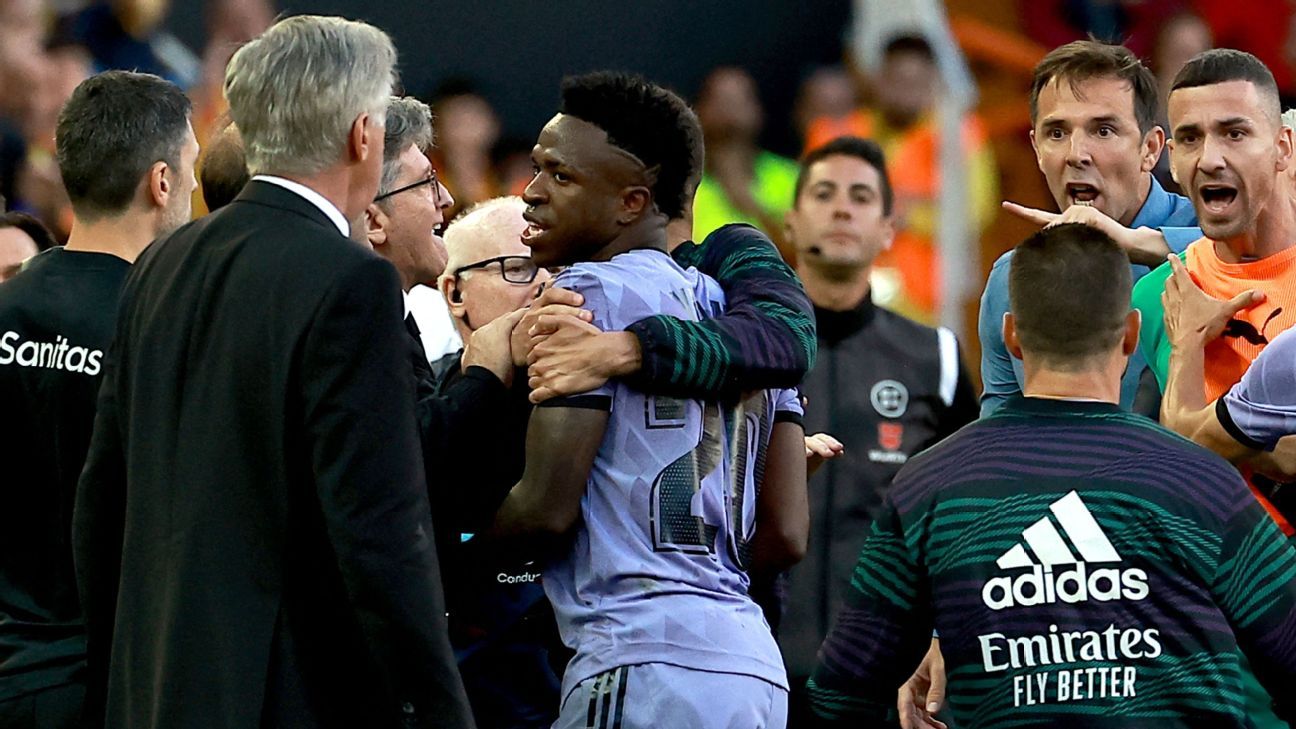
Real Madrid forward Vinícius Júnior will testify via videoconference before a Court of Instruction in Valencia where three individuals accused of racially abusing him in Sunday's LaLiga game at Valencia will also testify as part of the investigation.
Three fans between the ages of 18 and 21 were detained by police earlier this week in connection with the alleged racist episode that led to Sunday's league game between the sides at the Mestalla stadium paused in the second half as Vinícius reported opposition fans to the referee.
A court in Valencia on Friday opened an investigation into the alleged racist episode.
As a victim, Vinícius will testify via video conference at a date yet to be determined while the three individuals have also been ordered to testify.
The latest case of racist abuse suffered by the Brazil international in LaLiga has prompted widespread reaction from government officials in Spain and worldwide.
LaLiga president Javier Tebas, meanwhile, met on Friday with Brazil's ambassador in Spain, Orlando Leite Ribeiro, in Madrid and both expressed their commitment to fight racism.
"The Embassy of Brazil and LaLiga strongly condemn any racist manifestation and undertake to continue fighting against this scourge that affects sport and compromises the image of Spain, a welcoming country where athletes of all backgrounds, creeds and ethnicities can thrive," a LaLiga statement said.
Tebas said on Thursday that he would support clubs being hit with points deductions as punishment for racist episodes.
Valencia CF, meanwhile, have had their ban against the stand closure of the Mestalla stadium reduced to three games upon appeal.
The Spanish Football Federation (RFEF) initially ordered Mestalla's south stand partially closed for five games after the incident but Valencia won an appeal on Friday and saw the ban reduced to three games and the fine also cut down from €45,000 to €27,000.
How Luton Town got within 90 minutes of the Premier League
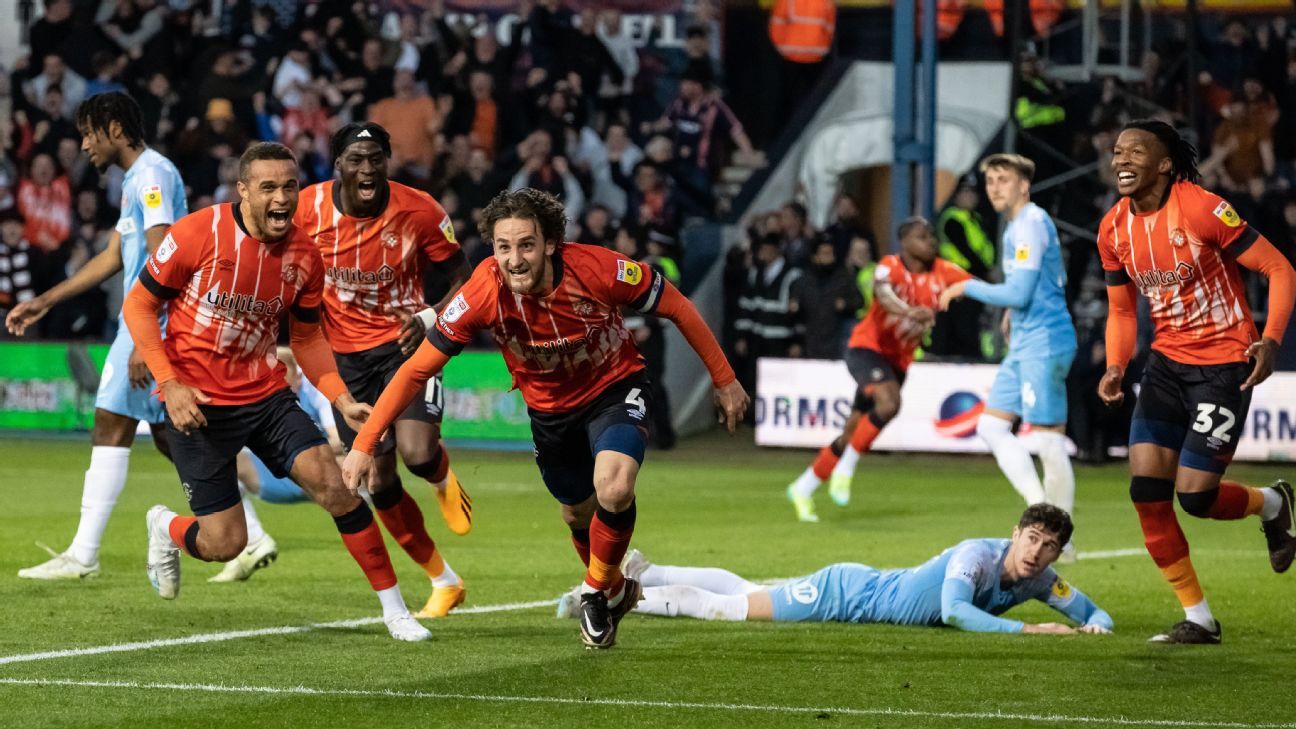
LUTON, England -- Oak Road has become an unusual tourist attraction. Search for it on Instagram and you'll see an array of photographs that define how so many English football clubs have been rooted in their communities for more than a century. They also illustrate the fairy-tale story of Luton Town FC, a club that's one game away from the Premier League, just nine years after "doing a Wrexham" and winning promotion from the National League.
If Luton defeat Coventry City in the EFL Championship Play-Off Final on Saturday -- it is billed as football's £180 million game due to the financial rewards of being in the Premier League -- the Hatters will have made the journey from nonleague to Premier League in less than a decade.
Over to you, Ryan Reynolds and Rob McElhenney.
- Watch LIVE: Luton vs. Coventry, Sat. 5/27, 11:40 a.m. ET, ESPN+
But nothing crystallises the Luton story quite like the Oak Stand at Kenilworth Road, the club's tiny 10,356-capacity stadium, which welcomed supporters from Braintree Town and Welling United less than 10 years ago. Next season, fans from Manchester United, Liverpool and Arsenal could be making the same journey through turnstiles wedged between Nos. 99 and 103 Oak Road and then across a metal staircase that cuts through the back gardens of the houses on the street.
"It annoys me and makes me giggle when you get the social media content about an away end going through gardens," Luton chief executive Gary Sweet said. "It's been like that since World War II or even before. Why is it raised now -- is it just because we might be going into the Premier League?
"Erling Haaland's not going to walk through that entrance: he's going to walk through the other s--- entrance we've got. Embrace it. We've got thick skins; it also shows you don't necessarily need lavish surroundings to succeed.
"You can do all that without having a beautiful stadium. It is beautiful, though. The old girl is beautiful."
Former Luton Town managers John Still and Mick Harford explain what makes the club's Kenilworth Road stadium so special.
Kenilworth Road is certainly different. If Luton are promoted, their stadium -- opened in 1905 -- will be the smallest to ever host Premier League fixtures. The Main Stand is a jumbled patchwork of multicoloured wooden seats and plastic benches, while the players' tunnel is narrow enough to trigger memories of the days when scores were settled by opponents off the pitch, away from prying eyes and cameras.
If Luton are promoted, they face a £10 million to-do list of summer improvements in order to ensure their stadium meets minimum Premier League standards: it includes bigger dressing rooms, new floodlights, improved media/broadcasting facilities, a VAR system and a completely new stand to replace the enclosure opposite the Main Stand. Despite Luton's having approval to build a new 17,500-seater stadium at nearby Power Court, the Premier League could be less than three months away; Kenilworth Road, which is 30 miles north of London, will be getting a rapid upgrade.
"If anyone can do it, we can," Sweet said. 'We've got to practically rebuild a stand, but we'll have gone from non-League to the Premier League, so we can manage that small matter."
Mick Harford has seen it all with Luton Town. The 64-year-old won two England caps while playing for the club in the 1980s, when Luton established themselves in the old First Division, and he played on the day when the team beat Arsenal at Wembley to win the EFL Cup in 1988. He was also in charge as manager when Luton completed their slide from England's top division -- they were relegated in 1992, three months before the start of the Premier League -- to non-League with relegation to the National League in 2008-09, after starting the season with a massive 30-point deduction imposed by the EFL and English FA for financial irregularities dating back several years.
That sanction, which condemned Luton to relegation, remains an open wound among the club's supporters, as borne out by a banner -- Luton Town, Est. 2008, Betrayed by the FA 2008 -- which still hangs in the Main Stand.
Harford, now Luton's chief recruitment officer, admits that the club has been on an incredible journey. "It's been a roller-coaster ride, especially for the fans," Harford told ESPN. "When I first signed for Luton [in 1984], there was a dressing room full of international players. It was a really good team and we could compete with the likes of Manchester United, Arsenal, Tottenham and Liverpool. We had a bit of a golden era.
"But after that, players left, I left and I came back, but all the players left. The club went in a chain of different owners, changed hands a few times, and they just went on a downward spiral. Then they got into monetary problems and got deducted points, and as soon as you start deducting points, it becomes difficult to attract players to your club. Things just went downhill from there and we went down into the National League and were there for five years.
"As we all know, it's very, very hard to get out the National League. Look how long Wrexham's been down, and they're a big club. Did I fear for the club? I think everybody does when they go down to that level."
After four seasons of failing to escape the National League, Luton hired John Still as manager in 2013. Still had enjoyed a record of success at National League level stretching back over 20 years, having won promotion to the EFL with Maidstone United (1989) and Dagenham & Redbridge (2007), and his appointment proved to be the catalyst for Luton's rebirth and rise.
"It's a fantastic story, isn't it?" Still told ESPN. "If somebody wrote it, it wouldn't be fact, it would be fiction.
"When I arrived, I felt there was a desperation among everybody and supporters were putting the players under lots of pressure because they genuinely felt they should be a Football League club. The biggest thing was trying to get everybody singing from the same hymn sheet, and getting the supporters to really back the players, so I used to do a thing at the end of the game where I had a little meeting on the pitch and I used to pull someone out of the crowd to come in, to involve the supporters and make them feel they were involved. And we gradually turned it around."
Still won promotion in his first season in charge, restoring Luton to the EFL. Promotion from League 2 (alongside Coventry City) followed in 2018, with the team going up from League 1 at the first attempt in 2019. Three promotions in nine years, and a fourth is potentially just 90 minutes away on Saturday.
Midfielder Pelly Ruddock Mpanzu has been in each promotion-winning team, and the 29-year-old will become the first player in history to play for the same club in the National League, League 2, League 1, Championship and Premier League if he helps guide Luton to the top flight. "It's been an adventure," Mpanzu said. "Not a lot of people have done it -- I think I'll be first -- but it's all about having people who believe in you.
"Did I want to come here when I left West Ham? Absolutely not! But Luton believed in me, gave me a chance and now we just have 90 minutes to go. We've come a long way from a training ground with dog walkers cutting across our pitches and getting changed in portable cabins, but hopefully by 7 p.m. on Saturday, we'll be in the Premier League and drinking champagne."
Luton won just two of their first nine Championship games this season -- Coventry made an even worse start, winning one and losing four of their first nine -- but their form since the beginning of January, with two defeats in 21 games, propelled them into the playoffs with a third-place finish. USMNT goalkeeper Ethan Horvath and 20-goal top scorer Carlton Morris have been key figures.
The departure of manager Nathan Jones to Southampton in November could have wrecked Luton's prospects this season, but the appointment of Rob Edwards has proved to be a masterstroke. Edwards guided Forest Green Rovers to promotion from League 2 last season before moving to Watford, Luton's traditional rivals, last summer. But after being fired following just 11 games in charge there, Edwards is now on the brink of a second successive promotion, but this time to the Premier League.
Luton Town and USMNT goalkeeper Ethan Horvath explains why their Championship playoff final vs. Coventry is such a big deal for the club.
"It's been a wild season for me to say the least," Edwards said. "I hoped to get promoted at the beginning and it didn't really work out at Watford. It's a bit strange, it's different.
"People ask me about a winning formula, but it comes down to good people. Anyone could've come in and done what I've done, it's been pretty easy really. I'm just lucky they picked me."
Luton, meanwhile, believe they have hit the jackpot by hiring Edwards. "We couldn't have had a better human being come in than Rob," chief executive Sweet said. "His image and persona is impeccable, and he reflects our image and persona. I think he's actually a bit better than we are."
The mutual appreciation between Edwards and Sweet is a reflection of Luton as a club. Those years in the lower leagues, battling to escape the National League, seem to have forged a togetherness and family spirit that are rare at the highest level of the game. To further underline the community aspect of the club, a group of supporters started an online fundraiser this week, aiming to raise £500 for Kenilworth Road's ticket office staff to have a free day out at Wembley on Saturday. By Thursday morning, the figure raised exceeded £5,000.
"There's a lot of love here," Edwards said. "It's about more than just football, it's about people's lives. I've sensed it and sense it's been like that for a while. People will be going to Wembley to win, and if we don't there will be devastation and a period of mourning, but when you look where we've been, things could be a lot worse and we are on our way back."
- Stream on ESPN+: LaLiga, Bundesliga, more (U.S.)
If Luton do make it, Kenilworth Road will get its last dance in the Premier League. A throwback to different times, but an experience that no player or supporter will forget. "The stadium is brilliant," Harford said. "When there's 10,000 people in here, it sounds like there's 60,000. It'll be a sad day when we leave it, an absolutely sad day, but we're going to have to leave it one day, hopefully very soon.
"If we can get into the Premier League, we will be given money to put towards a new stadium and that will give us a foundation for the next 20, 25 years to take this club forward."
ECB chair: 'We're signed up with the Hundred until 2028'
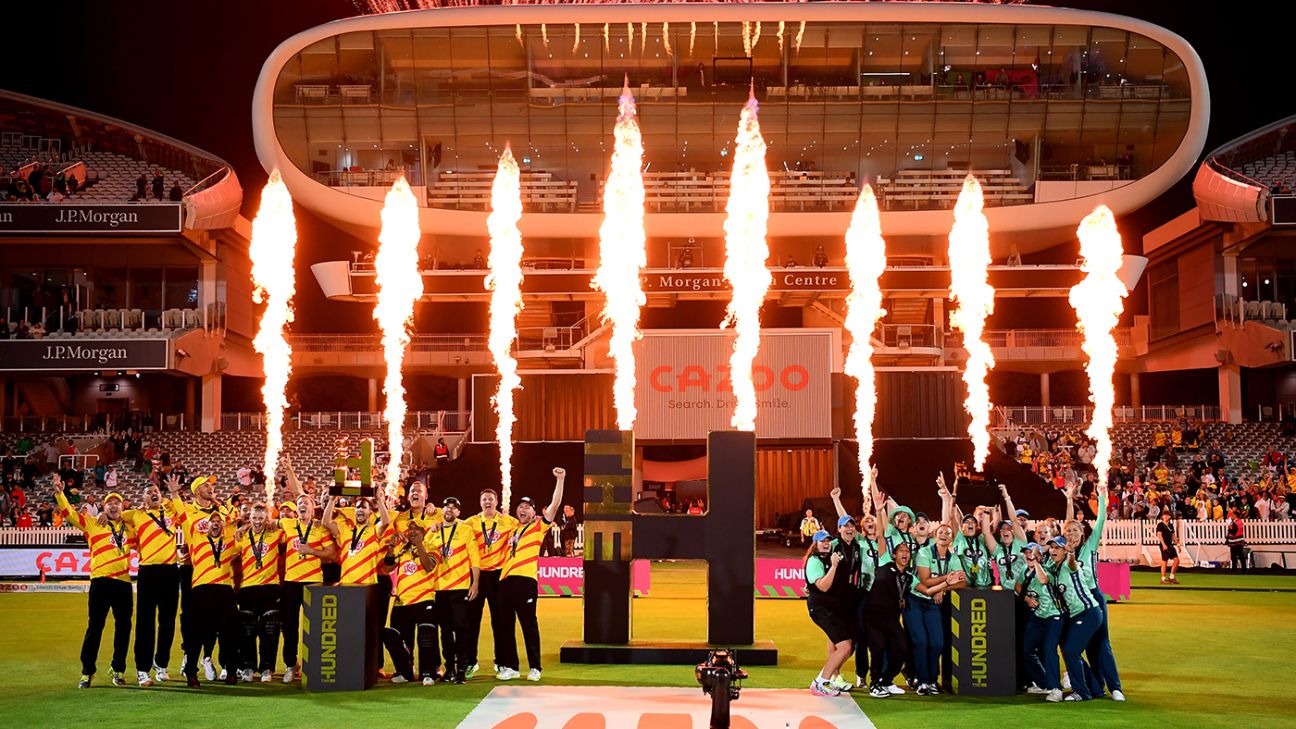
The Hundred is going nowhere before the end of 2028 and has "a long and successful future well beyond that", according to the ECB's chair.
Several outlets reported last month that Richard Gould and Richard Thompson - the ECB's chief executive and chair respectively, who previously held the same roles at Surrey - were discussing options to adjust the format of the eight-team, 100-ball competition, or even to scrap it altogether.
But, in an interview in the June edition of the Cricketer magazine, Thompson said that there had been "an awful lot of misreporting" on the tournament's future, emphasising that it is part of the ECB's lucrative broadcast deal with Sky Sports which runs until the end of 2028.
"We're signed up with the Hundred until 2028 and there's been an awful lot of misreporting around that," Thompson said. "The reality is that the Hundred exists with Sky until 2028 and I'm sure it has a long and successful future well beyond that."
A report by Fanos Hira, the Worcestershire chair, earlier this year suggested that the Hundred had made a £9 million loss to date, figures which the ECB disputes. Thompson said: "It's a historical report looking at the income and cost base of the ECB. And it [the Hundred] will help us across the game.
"It depends how you attribute those costs," he added. "Especially the £1.3m that each county receives a year [which is directly linked to the Hundred]. The game has invested a significant amount of money into the Hundred to ensure that it finds a new audience, which it has done. But the reality is it's an investment in the future."
The Hundred takes place in a standalone window from August 1-27 in 2023, the first time that it has not clashed with any England men's or women's international cricket. As a result, the final Test of the English summer is due to finish on July 31 - a situation that Thompson said "absolutely will not" happen again.
"It doesn't feel right, does it? Finishing the Test season in July means the whole season feels truncated," he said. "My understanding of the decision was they felt there are a significant amount of white-ball internationals playing through September.
"And the idea behind that was to give us the best possible chance of defending the 50-over World Cup which starts in October. But certainly, you don't want a situation where you're playing just one format or one tournament in the way we are at the moment… the Test summer absolutely will not be squeezed like this in future."
Winners of WTC final between Australia and India to take home US$ 1.6 million
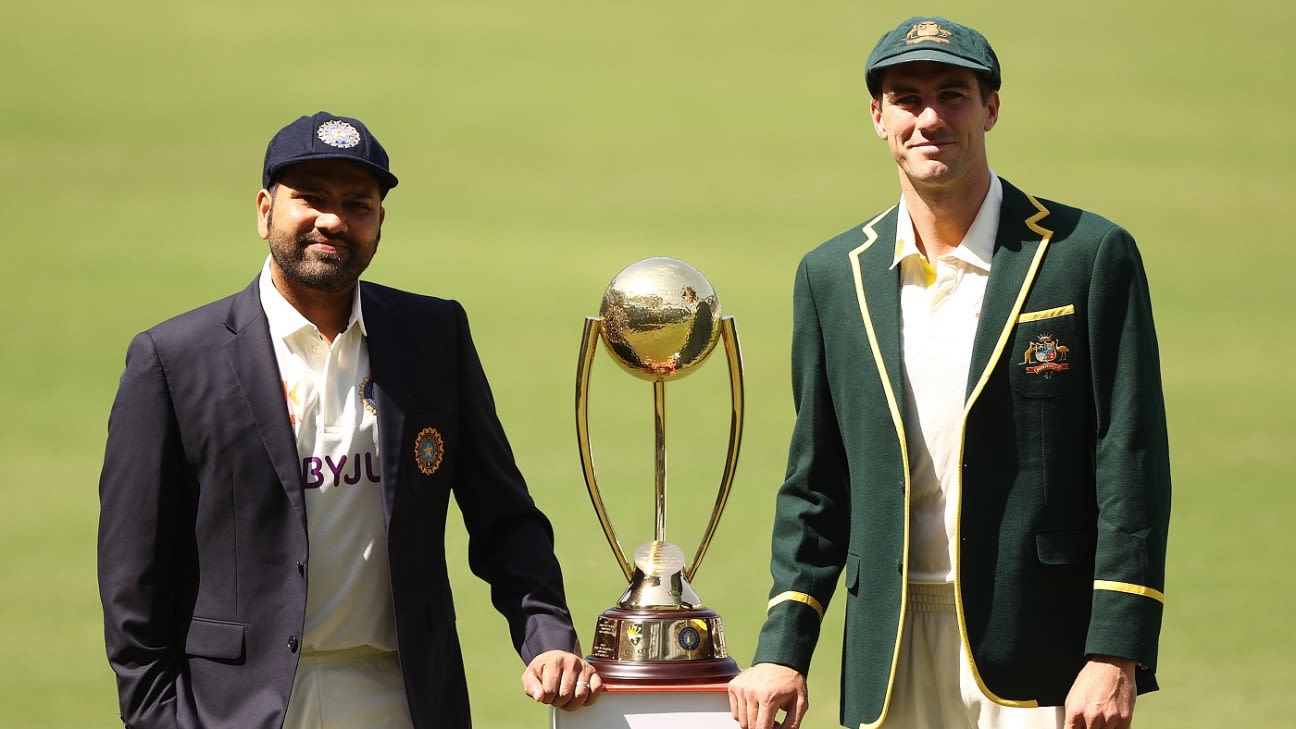
The winners of the World Test Championship (WTC) final between India and Australia is set to become richer by US$ 1.6 million, while the runners-up will get $800,000, the ICC announced on Friday.
Third-placed South Africa will earn $450,000, while England, who ended fourth, will get $350,000. Sri Lanka, with a fifth-place finish, will earn $200,000, and numbers six to nine, New Zealand, Pakistan, West Indies and Bangladesh, in that order, will get $100,000 each.
The final of the 2021-23 WTC will be played from June 7 to 11, with June 12 as reserve day. While Australia had finished as table-toppers after winning 66.67% of their allotted points, India were second with 58.80%. The two teams had also met in a four-match series in India earlier this year, which India won 2-1.
This happened despite neither side playing any Test cricket recently, since the rankings consider a specific period and series completed before that period lose some of their value. In this case, the rankings considered all series completed since May 2020, with series completed before May 2022 weighted at 50% and everything since weighted at 100%.
FA reduced Toney's ban due to betting addiction
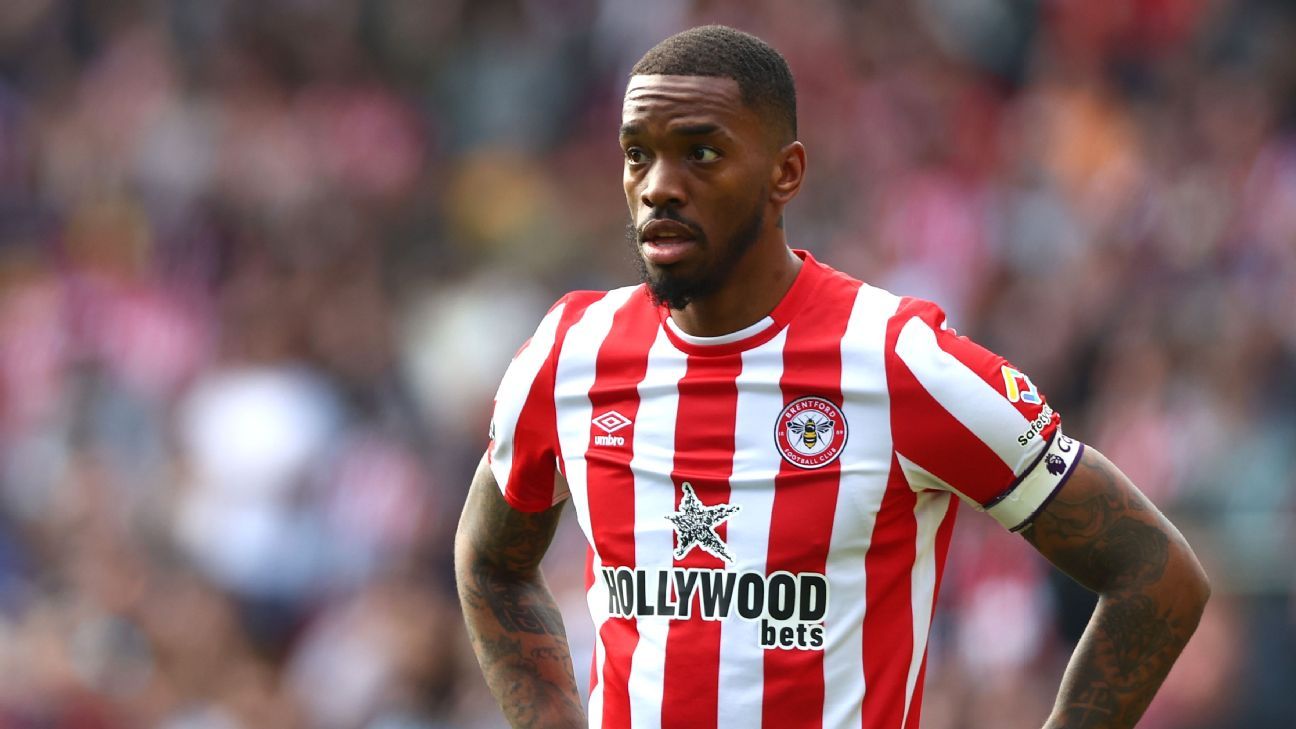
Brentford striker Ivan Toney has been diagnosed as a gambling addict, which led him to bet on his own clubs to lose matches, according to the English Football Association's (FA) reasons for handing him an eight-month ban.
The 27-year-old was hit with the suspension and a £50,000 fine earlier this month after he accepted 232 breaches of the FA's rules on betting.
- Stream on ESPN+: LaLiga, Bundesliga, more (U.S.)
English football's governing body published the independent regulatory commission's full verdict on Friday and revealed they pushed for a 15-month ban but handed down a reduced punishment after taking into account the striker's guilty plea and evidence from a psychiatry expert who concluded he is an addict.
The FA report read: "The Commission had the benefit of a report from Dr Philip Hopley dated 2 February 2023 who also attended the hearing by video conference to answer questions.
"Dr Hopley had interviewed Mr Toney on two occasions and concluded in his report that Mr Toney has a clear history of gambling addiction.
"There is no need to set out the details of the report in these reasons. It was Dr Hopley's conclusion that Mr Toney needs professional help in respect of his addiction."
It has also emerged that Toney placed 13 bets on his own team to lose in seven different matches between August 2017 and March 2018 when he was on loan from Newcastle United at Wigan Athletic and then Scunthorpe United. He did not play in any of those matches.
In another charge, Toney told a friend that he would start his club's next game in March 2018 when it was not public knowledge and also admitted lying to the FA when first questioned about the charges. Toney has now stopped gambling on football, and the report stated he is "determined to address his gambling problem with therapy."
England manager Gareth Southgate was critical earlier this week about the extent of the ban, and said the football community should do more to support Toney rather than ostracise him, particularly given he is not allowed to train with Brentford until mid-September.
Brentford said in a statement: "Brentford FC has received and accepted the written reasons of an independent Regulatory Commission that handed Ivan Toney an eight-month ban from all football and football-related activity after he admitted breaches of FA Rule E8, relating to placing bets on football.
"The club will now be doing everything possible to provide support to Ivan and his family to deal with the issues raised in this case. Conversations regarding this and all matters relating to the case will remain confidential in order to protect the player and his family.
"We consider this matter closed and look forward to welcoming Ivan back to training in September and seeing him representing Brentford in the Premier League in January."
Baseball player killed while tearing down dugout
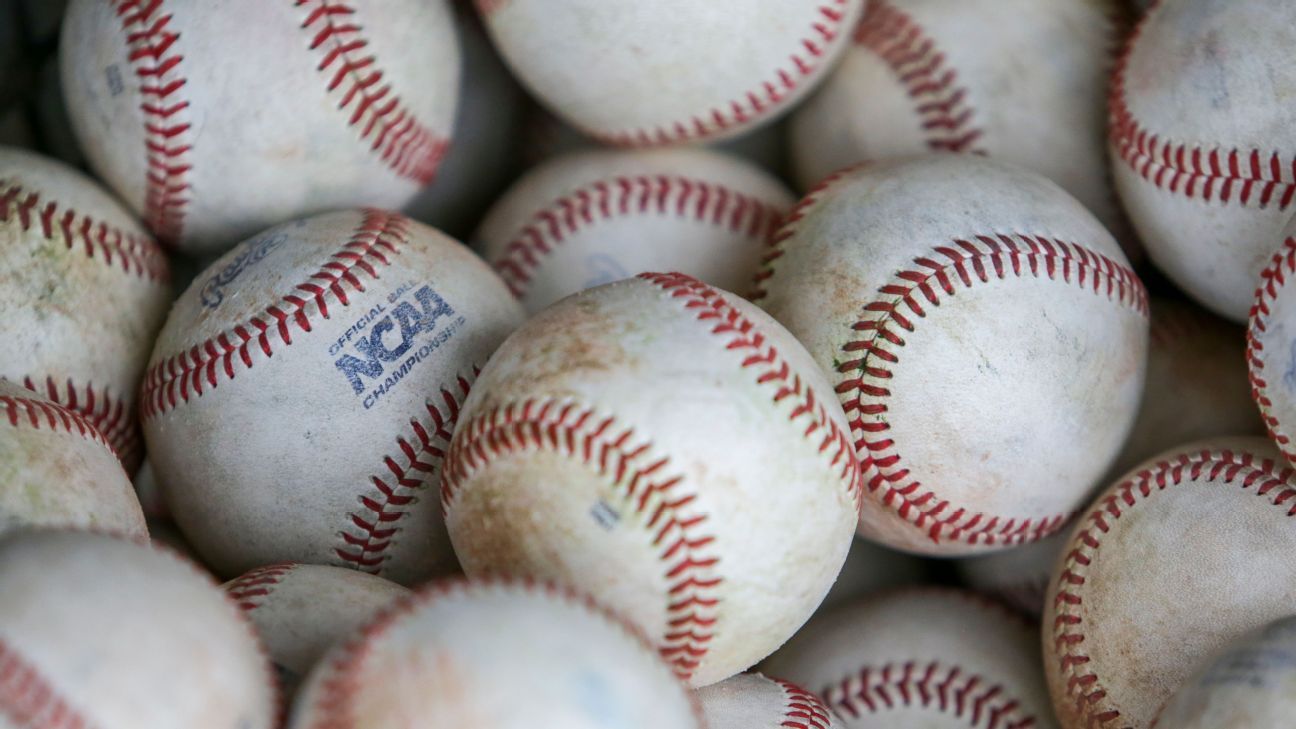
HARRISBURG, Pa. -- A college baseball player died after he was struck in the face when a makeshift dugout he was helping to dismantle collapsed on him this week.
Angel Mercado, 19, was a middle infielder who had just completed his freshman season at Division II Central Penn College. He had been playing in a summer recreation league that held its games and practices in a park in Harrisburg.
The coach of Mercado's team had built a makeshift dugout there out of wood on Sunday, but city officials told him it wasn't allowed. Mercado was among a group of players dismantling the structure Monday afternoon when it unexpectedly collapsed and he was struck in the face.
Mercado suffered a traumatic head injury and was taken to a hospital, where he died Tuesday. The Cumberland County coroner's office ruled the death an accident.
"Nothing criminal happened here," city spokesman Matt Maisel said. "No charges will be filed against the coach. No charges will be filed against anyone. This is simply a tragedy."
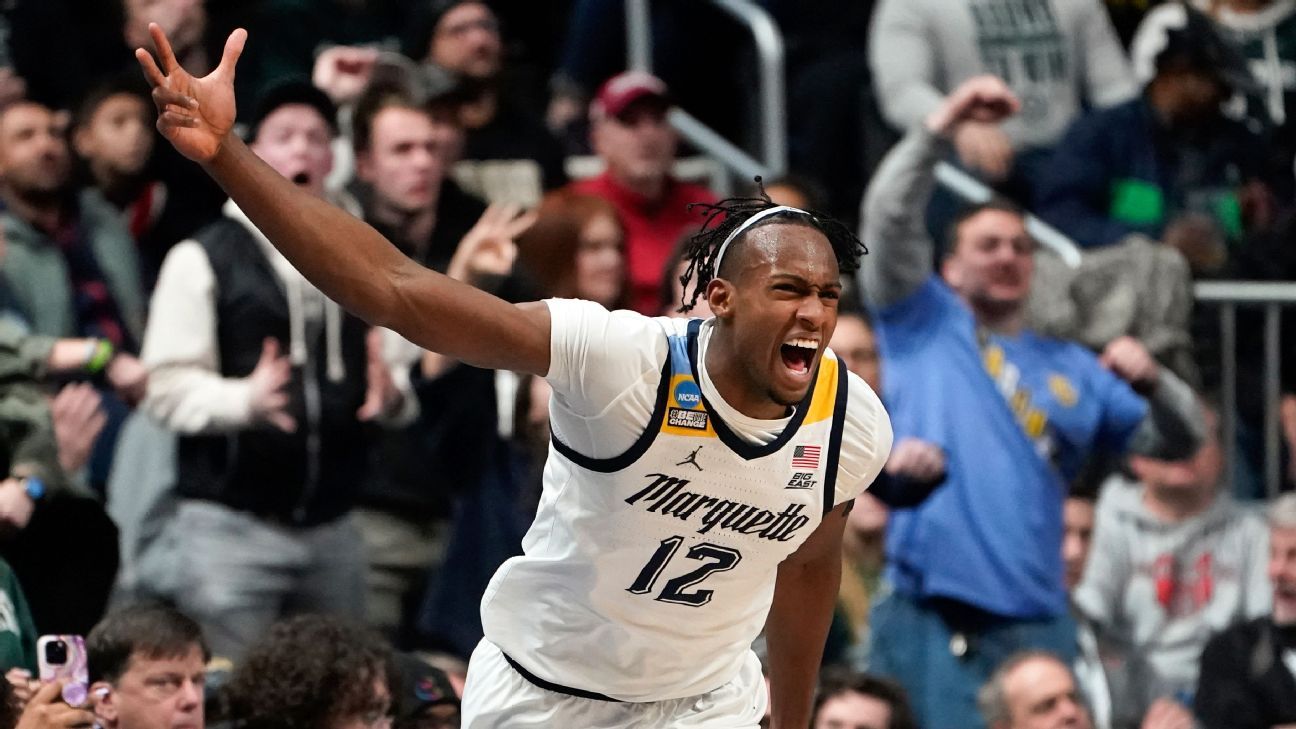
Olivier-Maxence Prosper is keeping his name in the 2023 NBA draft and will forgo his remaining eligibility at Marquette, he told ESPN on Friday.
"After talking to my family, agents, and evaluating the feedback I've gotten after the draft combine and my pro day, I've decided to keep my name in," Prosper said. "Teams say they are really intrigued by me and value my skill set and ability to impact the game on both ends. I'm ready to make that jump and go after this."
The 6-foot-8 Prosper, the No. 32 prospect in the ESPN 100, has had a strong pre-draft process that has elevated his standing in the eyes of NBA teams from fringe prospect to potential first-round pick. He posted 21 points and 7 rebounds in 22 minutes in his lone game at the draft combine and conducted a well-attended pro day in Los Angeles on Tuesday where several NBA executives told ESPN they were impressed with his perimeter shooting and explosiveness. He participated in five individual workouts with NBA teams before the combine and now has a busy schedule the next four weeks that will see him visit most of the teams picking in the first round.
"Coming out of college, people were questioning the consistency of my jumper," Prosper said. "That's something I've really worked hard to show NBA teams I can be a catch-and-shoot player. I have the ability to improve and become very versatile on both ends. If some teams weren't sure, I've shown them I can do more things on both ends in this process."
Prosper helped Marquette win the Big East regular-season and conference tournament championships, averaging 12.5 points in 29 minutes while bringing outstanding defensive versatility with his high intensity level, 7-foot-1 wingspan and ability to cover ground on the perimeter.
A young junior who is just 4½ months older than one of the top freshmen in college basketball last season in Brandon Miller, Prosper fits a prototype many NBA teams are actively seeking with his ability to play either forward spot as his perimeter shooting (34% from 3 last season) continues to evolve.
"My game translates really well to the NBA," Prosper said. "It's a positionless league, and wings like me who can guard multiple positions, run the floor, finish in transition and make catch-and-shoot 3s find ways to make winning plays and impact games. Based on what I've been told, there's no reason I shouldn't be a first-rounder."
Marquette, which was slated to return almost its entire roster next season, was projected as the No. 3 team in ESPN's early preseason rankings with the assumption that Prosper would return. His departure is a blow for Shaka Smart's Golden Eagles, who will have to scramble for a late replacement in the transfer portal or high school ranks. Rising junior David Joplin and rising sophomore Ben Gold will likely be called on for added responsibility.
Jonathan Givony is an NBA draft expert and the founder and co-owner of DraftExpress.com, a private scouting and analytics service used by NBA, NCAA and international teams.
'Every time I would go play, I doubted': How Ronald Acuna Jr. regained his confidence -- and his MVP form
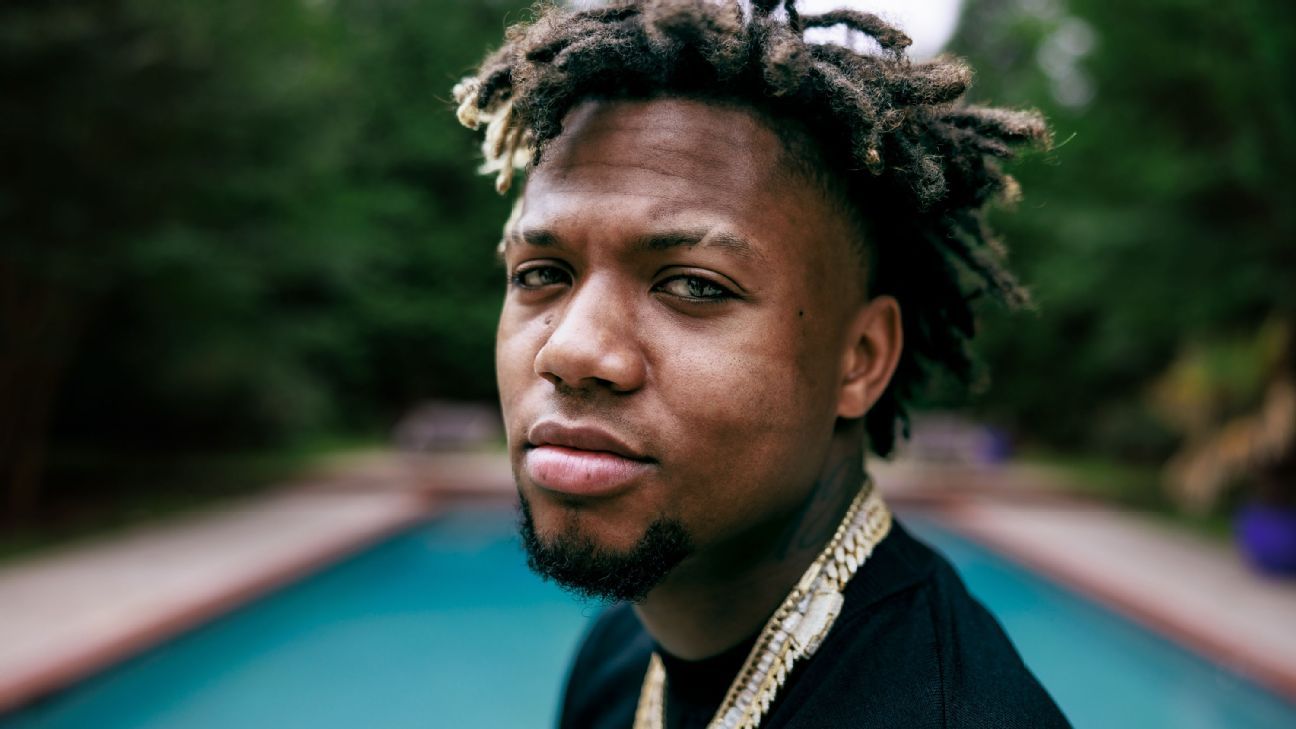
MARIETTA, Ga. -- The living room of Ronald Acuña Jr.'s two-story, craftsman-style home looks more like a sports memorabilia store, replete with mementos from a career that blossomed earlier than most. All-MLB plaques and commemorative baseballs dot two sets of bookcases on each side of a white fireplace. A signed lineup card from last year's All-Star Game in Los Angeles sits on one, a Team Venezuela batting helmet from this year's World Baseball Classic rests on the other. In the middle, an oversized picture of a smiling, 20-year-old, tuxedoed Acuña posing with the 2018 National League Rookie of the Year Award overlooks it all.
Acuña, now 25, takes no credit for the arrangement.
"That was my mom," he says in Spanish. "She's the one who decorates."
It's an overcast, muggy afternoon May 18, a Thursday off-day that doesn't quite feel like one because Acuña and his Atlanta Braves teammates didn't touch down from Texas until 3 a.m. The past four games of that road trip saw Acuña unleash four home runs that averaged 440 feet. A little more than a quarter into the season, Acuña stands on pace to surpass 40 home runs, 60 stolen bases, 100 RBIs and 150 runs, a combination of numbers that have never been reached.
Acuña, wearing tight-fitting black pants with blue-and-white bands that resemble streaks of lightning and high-top sneakers that were clearly designed to match, smiles at the thought of what 2023 is becoming.
Acuña looks like the most exhilarating, dynamic baseball player in the world again, a sentiment that extends beyond his numbers (a .332/.419/.577 slash line, 11 homers, 22 steals and 2.6 FanGraphs wins above replacement, tops among position players). He's wreaking havoc on the basepaths, crushing prodigious home runs with regularity and making highlight-reel defensive plays seem routine.
It all feels, well, normal, as if this is how it always goes. As if it hadn't been three years -- four if you count the COVID-19-shortened 2020 season -- since this version of Acuña presented itself with regularity.
To Acuña, though, none of this feels like a given, not when those three years featured a devastating knee injury and a subpar return from it. Through it all, one of the most outwardly confident athletes of our time wondered if he'd ever be good again.
IT WAS JULY 2021, and Acuña couldn't stop crying. An awkward landing on a leaping attempt in Miami had caused a torn anterior cruciate ligament in his right knee, an injury that typically comes with an eight- to 12-month recovery and leaves an uncertain future beyond it. Acuña, then only 23, had already secured a $100 million extension and was three days shy of his second All-Star Game start, in the middle of his best year yet. Now he had to wonder if he would ever be the same.
"He cried every day," Acuña's mother, Leonelis Blanco, said in Spanish. "It wasn't just every day -- it was the whole day. He was distraught, crying, crying, wondering about his leg."
Acuña -- with a father, Ronald Sr., who spent six years in the New York Mets' minor league system, and four cousins, most notably Kelvim and Alcides Escobar, who reached the majors -- lived and breathed baseball since birth, Leonelis said. When he was 9, he was appreciably better than the other children his age in La Guaira, a port city in northern Venezuela. At 11, it was clear he would make a career out of the sport.
Leonelis had only known Acuña to be excellent and assertive. But in the two weeks that spanned his ACL tear and subsequent surgery, he was exceedingly vulnerable, refusing to watch baseball games and pondering the possibility of never playing again. Most of his days were spent lying in bed. Leonelis never left his side. She played music, cooked his favorite foods, brought up other topics of conversation and did her best to project positivity. When the subject of baseball inevitably returned, she clung to three phrases.
Paciencia, hijo. (Patience, son.)
Confía en ti. (Believe in yourself.)
Libera tu mente. (Free your mind.)
"Terrible," Leonelis said of those conversations, every one of which she remembers. "It was really, really hard."
As his knee improved, so too did Acuña's state of mind. Simply ditching the wheelchair to walk on crutches noticeably lifted his spirits. Later that season, while the Braves excelled with a makeshift outfield constructed before the end of July, he found joy through his teammates' success. When the World Series came, he asked to be cleared for travel. It allowed him to be in Houston on Nov. 2, when the Braves became one of the most improbable champions in recent memory. That night, Acuña's body froze. He then felt a chill run through both of his arms. The tears flowed shortly thereafter.
"I cried out of joy," Acuña said, "but also I cried because I couldn't be there with my teammates. I couldn't be there day to day; I couldn't be there with them."
Those feelings directly impacted the following season.
"He missed it so much in '21, when we won a championship, that he was definitely going to be part of the team in '22," Braves first-base coach Eric Young said. "It didn't matter. If he was well enough to go, he was going out [even if not fully healthy]. That was his mentality. And I don't fault him for that."
ACUÑA RETURNED TO the Braves on April 28, 2022, and played in 119 of the team's remaining 143 regular-season games, plus four more in the playoffs -- but he was never truly himself.
Young, Acuña's coach through his entire major league career, noticed it in how slowly he cut off base hits in the gap. Austin Riley, Acuña's teammate dating to rookie ball, noticed it in the batting cage, where the ball didn't quite jump off his bat like it used to. Braves third-base coach Ron Washington, going on his sixth decade in the major leagues, noticed it in how infrequently his typical burst would arrive on the bases. Brian Snitker, his manager, noticed it in the deluge of reports from the training staff that detailed Acuña's constant need for treatment.
Acuña felt it everywhere -- when he didn't rotate his hips quickly enough to reach fastballs, when he didn't explode well enough to track down distant fly balls, when he didn't come out of his stride fast enough to steal bases.
"I put a lot of pressure on myself, like, 'I have to get back to being who I was before,' and I think that influenced a lot," Acuña said. "Things didn't turn out the way I wanted them to. The knee -- there were days when it wouldn't hurt, I'd go out and play a hundred percent and I'd tell myself, 'I'm back,' but then the next day the pain would return. It just kept going like that."
Acuña was selected by fans as the starting right fielder in the All-Star Game, but he finished with a .764 OPS that fell 161 points below his career mark heading into 2022. He stole 29 bases but was thrown out an NL-leading 11 times. Defensively, he was credited with negative-seven outs above average, placing him among the worst at his position.
On the outside, Acuña continued to flaunt jewelry and smear eye black and celebrate boisterously.
Inside, doubt consumed him.
"I would tell my mom, 'Mom, I don't know if I'll ever run the same again.' Or my dad, 'You think I'll go back to playing the same?'" Acuña said. "The pain was not easy. The operation also was not easy. So I doubted many times. I would tell my friends, 'I don't know if I'll be able to play that way again.' Every time I would go play, I doubted."
IN 2018, Young's first season coaching Braves outfielders, coincided with Acuña's rookie year. The two have been inseparable since. If anybody can reach Acuña, it's Young. And when the 2022 season ended, Young felt the need.
A week after the 101-win Braves were eliminated by the resurgent Philadelphia Phillies in mid-October, Young called Acuña to chat. He wanted to help set the tone for what would become the most important offseason of Acuña's career.
"You talk about the best players in the game -- Ronald Acuña's name's got to be mentioned," Young recalled saying. "And I told him, 'It's not going to be mentioned because you've got these skills and you're talented. You have to do it in between the lines each and every single day to gain respect from your peers. Your peers are the ones telling you who's the best player in the game. If you go out there and you do the things that you're capable of, there's no other person out there that can do it like you.'"
Young's words helped to reaffirm a mindset Acuña was already carrying with him. He waited another week or so for his knee to become fully healthy -- it finally did at the start of November, convenient yet cruel timing -- then set out to test it like never before.
"I told myself, 'I have to work and I have to get back to being 100 percent,'" Acuña said. "'It's either going to be 100 percent the good way or 100 percent the bad way.'"
Acuña wanted to play as much baseball as possible as quickly as possible. He planned to take part in the Venezuelan Winter League in December, then represent his country in the 2023 World Baseball Classic. Before that, though, he would take a detour to the Dominican Republic to hit with Fernando Tatis Sr., the former major league third baseman and father of one of his closest friends.
Acuña and Fernando Tatis Jr., the San Diego Padres' superstar shortstop-turned-outfielder, met near the end of April 2019, when Tatis paid his first visit to Atlanta early in his rookie season.
"You feel the chemistry from the moment you say hello," Acuña said. "You say, 'That's going to be my brother.' It's just a good vibe. Since then, we've been brothers."
Three and a half years later, from Nov. 10 until around Thanksgiving, Acuña and Tatis met on a field in Tatis' hometown of San Pedro de Marcoris and tried to rediscover their respective selves. Tatis, on the heels of a season lost both to a motorcycle accident and a steroid suspension, wore a cast on a surgically repaired left wrist that limited him to conditioning work. Acuña, meanwhile, hit almost daily under the watchful eye of a man famous for once belting two grand slams in a single inning.
Early on, Tatis Sr. suggested a minor tweak that turned into a major adjustment. He asked Acuña to lower his hands ever so slightly during his setup, down near the bottom part of his chest, making his bat parallel to his upper body in order to get its barrel through the strike zone more quickly.
"I was open to everything," Acuña said. "It's why I went down there."
Acuña struggled mightily to hit fastballs last season, slugging only .416 against four-seamers, 56 points below the major league average. This year, it's up to .773. His strikeout rate has been cut nearly in half, down to 14.1%. He is a better, more complete hitter than he ever has been, a product, he believes, of the changes he made in the D.R.
Acuña, a deep admirer of legendary countryman Miguel Cabrera, hopes to someday win a batting title. At this rate, at least, he'll secure his third Silver Slugger Award in five months.
"If I do," Acuña said, "I'll give it to Fernando."
YOUNG HAD BEEN keeping close tabs on Acuña's offseason work, and by the onset of spring training, he saw a new, more mature version up close. Acuña used to lag through the various stations of workouts, but suddenly he was displaying what Young described as "more focus, more intent" during outfield drills that often seemed to bore him.
The attention to detail, Braves coaches said, has spilled into the regular season, where Young said he is "not running away from any type of challenge in preparing for the game."
Acuña believes being a father -- he has two boys, a 2-year-old and a 7-month-old -- has brought a new level of maturity. Suffering the ACL tear in 2021, Young says, humbled him like never before. But simply being ordinary for perhaps the first time in his life might have played just as big a role in his transformation.
"I think he found out what he is, what he looks like, when he's not healthy," Washington said, "and that's the player he doesn't want to be."
Acuña, Washington added, is no longer solely relying on his eye-popping physical talent. He works diligently on his baserunning technique and studies pitcher tendencies for the first time. That focus, combined with new rules that have created the most favorable stolen-base environment in decades, have led Acuña to a 91.7% success rate. He's reading balls off the bat during pregame batting practice on a near-daily basis, as opposed to once a week. He's more diligent with his physical therapy and plyometric exercises. Lapses still occur, but they're far more infrequent.
"He used to hit ground balls, and if it wasn't a base hit he didn't run 'em out," Washington said. "Now, he's making those son of a b----es make plays out there. He's running everything out."
Last year, Braves trainers talked to NFL trainers to pick their brains about how running backs recovered from ACL tears like Acuña's. They were told that most players needed a full season and offseason to get back to their previous standards. It's a message the team continued to impart on Acuña, but one he didn't fully believe until experiencing it first hand.
And by the time he felt completely healthy, that doubt had become fuel.
"I would hear people saying, 'He's not going to run the same anymore, he's not going to be the same baseball player because people don't come back well from this surgery,'" Acuña said. "It was frustrating to hear people talk like that. But also, it motivated me. I practiced, I trained hard, I fought and now they're mistaken."
RILEY HAS FOUND himself on a dugout's top step for every one of Acuña's plate appearances this season.
"Just waiting for something to happen," Riley said. "It's pretty special."
Acuña hasn't disappointed. Through the season's first eight weeks, he ranks within the top 3% in exit velocity and hard-hit rate, within the top 17% in sprint speed and within the top 1% -- better yet, second among 187 qualified players -- in arm strength. Defensive metrics, prone to faultiness in small samples, still grade him as a below-average right fielder. But Acuña has already accumulated six outfield assists and turned in a handful of sensational plays, including two leaping catches against the outfield fence of his home ballpark.
Meanwhile, his already prodigious home runs have been legendary.
"It looks effortless," Braves second baseman Ozzie Albies said. "He just hits the ball and the ball keeps going."
Acuña unleashed a 461-foot home run to straightaway center field May 3 and followed with a 470-foot moonshot to left May 10. Five days later, he swung at a curveball only 1.3 feet off the ground and lined it 454 feet to left-center. Acuña has already totaled a major league-leading nine home runs that have traveled at least 420 feet, three more than the second-place Aaron Judge, who outweighs him by 80 pounds. In May alone, he has hit four home runs at least 450 feet. Every other player in the sport has combined for 18 of those this month.
"He's on his legs now, and you're seeing what he can do," Snitker said. "And he's maturing. He's growing up -- physically, mentally, the whole thing. The kid's starting to come into his own. It's kinda scary what he's capable of, honestly."
Acuña has acted as a crucial tone-setter for a Braves team that is already 12 games above .500 and 5½ games up in first place, slashing .500/.540/.804 while leading off. He's only three points shy of a 1.000 OPS, a mark reached by only six leadoff hitters since 1900, and is on pace to finish as the third player in major league history to combine 30-plus home runs with 50-plus stolen bases, not to mention the first to 30 and 60.
He's all the way back, but he's also better than ever.
Those who know him well are bullish.
"Acuña wants to be the best," Young said. "And if Acuña wants to be the best, his best is the MVP, in my mind. He's going to be the MVP this year. It's a prediction. I'm confident in that prediction."
Graham Williamson’s sons in charity run following cancer scare

Eighties middle-distance icon is in remission for cancer but his boys Jamie and Matthew are doing 24-hour run to raise money to fight the disease
Jamie and Matthew Williamson are doing a 24-hour charity run on June 5-6 to raise money to give back to the cancer community after their father, Graham, fell ill with the disease.
A 3:34.01 1500m runner in the 1980s, Graham was diagnosed with stage four malignant melanoma in 2019 but is now in remission after successful treatment in Germany.
“We are organising a charity run in June where we will run a mile every hour on the hour for 24 hours (24 miles in 24 hours) in aid of Worldwide Cancer Research,” says Jamie, who himself has run 3:41.59 for 1500m. “We are aiming to raise €2400 to give back to the cancer community.
“Any donations would be greatly appreciated and would go a long way in helping the fight against cancer and continue saving and improving the lives of people with cancer and their families worldwide.”
Graham held the Scottish recored for the mile for 40 years with 3:50.64 set in Cork in 1982 but it has since been beaten by Josh Kerr, Neil Gourley and Jake Wightman in the past 18 months.
Graham Williamson leads Dave Moorcroft (Mark Shearman)
He also ran a world under-20 1500m record of 3:36.6 – a time that still stands as the UK under-20 record today – and won the World University Games title in addition to racing for Britain or Scotland at the 1983 World Champs, 1982 Europeans and 1982 Commonwealth Games, plus the world cross country championships.
He was beset with bad luck, though. At the European Championships in Athens, for example, he fell mid-race and his long-time rival Steve Cram burst clear in the melee to take gold.
Williamson also lost a run-off with Cram for the final place in the 1500m team for the 1980 Olympics after losing his spikes and kit at the airport.
Troubled with injuries, he retired at 26. He later went on to enjoy a successful career with adidas, though.
All the details are on the justgiving page are here.
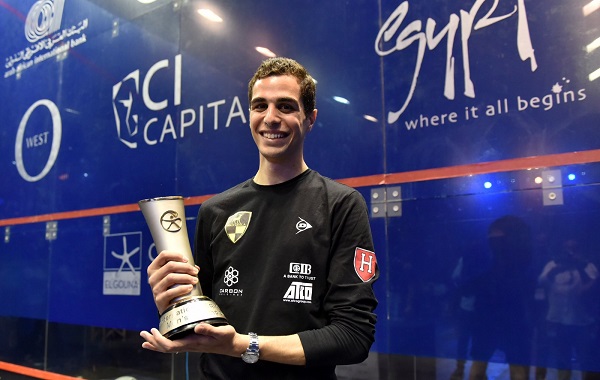
Ali Farag has revealed his determination to continue his recent hot streak at the El Gouna Squash International. The world champion will take to the court at the El Gouna Conference & Culture Center, having won three titles in succession for the first time in his career. But now, as he looks to make it four-in-a-row, […]













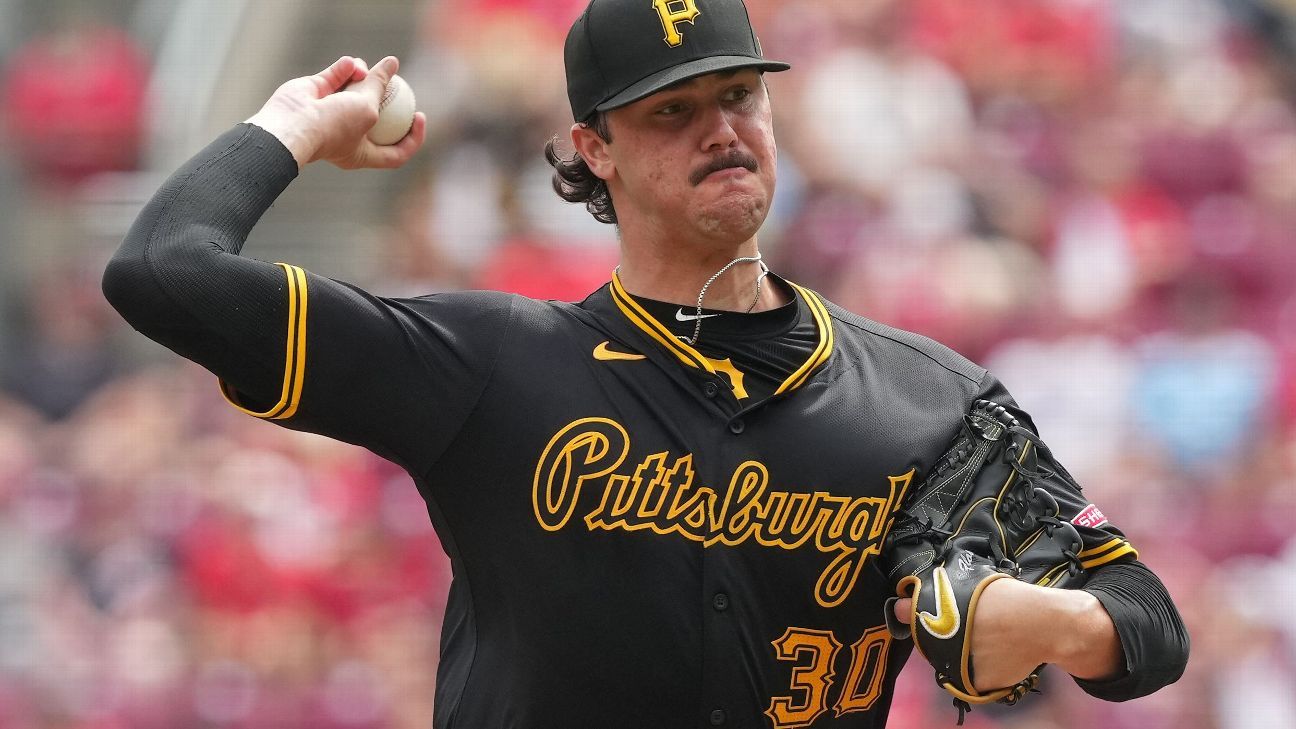

 Phone: (800) 737. 6040
Phone: (800) 737. 6040 Fax: (800) 825 5558
Fax: (800) 825 5558 Website:
Website:  Email:
Email: 






